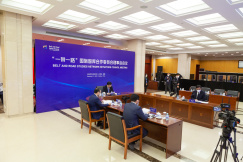
In March 2020, the European Commission published a White Paper outlining the cornerstones of a new European Industrial Strategy for a "globally competitive, green and digital Europe". The Commission acknowledges that "Europe has always been home to industry". It declared to be "ready to do what it takes to make sure European businesses remain fit to achieve their ambitions and cope with increasing global competition". The updated industrial policy from May 2021 reinforces these claims, stressing the need for a "strong and well-functioning single market – while strengthening our global competitiveness through open markets and a level playing field." From an economic point of view, such ambitions are warranted. However, if the EU is to remain attractive to internationally competitive knowledge-intensive industries in, say, ten years from now, policymakers need to embrace a more consistent and holistic approach to industrial policymaking. It requires a push for advancing the EU's Internal Market, more ambitious trade and investment policies, and maintaining strong incentives for innovation through intellectual property rights.
Principles for industrial and technology leadership
EU Member States can only thrive economically if they remain attractive to research- and knowledge-intensive industries. Citizens and businesses can only benefit from new economic opportunities if they have access new technologies and innovative products and services. This includes offers from outside the EU. Mercantilist ideas, like "EU first" or blanket "reshoring" measures, would have an adverse effect on Europeans' access to modern technologies, slow down the adoption of new business models, and reduce the EU's attractiveness to foreign investment. For the EU to "lead economically and technologically" in a globalised world requires ensuring that a pro-innovation industrial strategy links up to other strategies in a synergistic manner (e.g. the EU trade strategy, Green Deal, pharmaceutical strategy, Single Market policies, the Data Governance Act, IP action plan).
Increasing the EU's strategic resilience through Single Market integration
While the EU in total can be considered a top global destination of foreign direct investment (FDI), the EU still suffers from a high level of regulatory fragmentation. Market size is the key determinant of FDI as firms can expect to benefit from stronger economies of scale as well as a larger potential demand. This is important because research reveals that China and the US are outperforming most EU Member States as investment hubs. The "internal markets" of China and the US are more complete in terms of horizontal and sector-specific regulations, better allowing businesses in the US and China to scale to their potential. Also, the US is home to a much higher number of large and medium-sized SMEs than the EU, indicating that EU SMEs find it considerably harder to grow. The European Commission is aware of its "Single Market Disease" as acknowledged by Commissioner Vestager in 2020: "[o]ne of the reasons why we don't have a Facebook and we don't have a Tencent is that we never gave European businesses a full single market where they could scale up […]." The EU can support industrial and innovation leadership by reducing policy-induced barriers in the Single Market.
Industrial leadership with open market policies
International trade is a powerful force for technological transformation. Free trade agreements have stimulated trade, improved the quality and integrity of domestic economic and political institutions, and increased legal certainty, which are important for investments in knowledge-intensive industries. These include the protection of property rights and, more generally, the rule of law. EU businesses have experienced strong growth in patent-intensive exports. European businesses have climbed the value-added chain, particularly in major patent-intensive sectors, such as chemicals, pharmaceuticals, and motor vehicles. However, compared to China and the US, in recent years EU businesses have witnessed a relative decline of their export positions in these sectors.
To support Europe's knowledge-intensive industries, the EU should demonstrate a renewed commitment to its long-standing free trade doctrine, aiming to further the international regulatory playing field. Moreover, EU investment screening should be supportive to knowledge- and technology-intensive industries. At the same time, direct and indirect state aid and government ownership of global competitors should be combatted to maintain a global level playing field for competition. In its relations with non-EU governments, the EU needs to insist on an open and non-discriminatory investment- and trading system.
Industrial leadership from protecting IP and trade secrets
The EU needs to remain attractive to agile minds and companies that substantially invest in R&D. This is recognised by the Commission's Industrial Policy White Paper from 2020, which highlights that "[t]he EU also needs to ensure that its Intellectual Property policy helps to uphold and strengthen Europe's tech sovereignty and promote global level playing field. IP helps to determine the market value and competitiveness of Europe's firms." The Commission also acknowledges that it is companies' "intangibles, such as brands, designs, patents, data, know-how, and algorithms", which impact on their activities and value. Economic research demonstrates that strong protection of IP is essential for the creation of high value-added production, high wages and investment in education and professional qualifications (skilled labour). Across the board of knowledge-intensive industries, including manufacturing and services sectors, the highest value-added is generally generated in the beginning and at the end of value chains. Despite their importance for investment, high value-added production, and strategic autonomy, IPRs have frequently been under attack in the past, with the pharmaceutical industry being one of the latest examples. The European Commission's understanding of sovereignty tends to centre around one core theme: the reduction of dependencies from outside the EU – for example for pharmaceuticals. At the same time, to achieve affordable medicines and foster research into unmet medical needs, the Commission considers changes in the incentive structure for research in medicines and new obligations for companies that distribute medicines in the Member States. While the overarching objectives are merited, the present concept of strategic autonomy of Europe's pharmaceutical industry disregards that the EU is substantially lagging the US in pharmaceutical innovation – with rising competition from other parts of the word. Clinical trial pipeline data shows that Europeans could become increasingly dependent from non-EU suppliers of innovative medicines in many therapeutic areas. Accordingly, achieving strategic autonomy in Europe's pharmaceutical industry requires a public policy framework that much more than today rewards risk taking and investment.
From a cross-industry perspective, new data sharing policies could significantly undermine the EU's commitment to protect IP and trade secrets. Far-reaching data sharing obligations would have the opposite effect of what is intended. Unlike the EU's Strategy for Data from 2020, that could have had a very negative effect on research and innovation because it argued for "data should be available to all", with the proposed Data Governance Act (DGA) and the Data Act (DA), the EU aims to encourage voluntary data sharing through data intermediaries. While both laws are still in the making, their provisions recognise the importance of IP and trade secrets for innovation. Any EU trade policy in support of knowledge-intensive industries should promote high levels of protection for intellectual property rights and trade secrets and maintain appropriate enforcement instruments.
Conclusions
To sum up, the European Commission is right in arguing that a strong regulatory framework and new policy approaches are needed to support the competitiveness of key European industries. However, Europe's policymakers should not expect to encourage European companies to become more innovative by embracing prescriptive policies or by undermining IPR and trade secrets. Also, a focus on dirigiste approaches targeted at digital companies and technology-enabled business models would not help the EU to improve its global economic (and political) clout. Instead, the EU should focus on an effective IPR framework, an open and rules-based international trading system, and advancing the EU's Internal Market.

the Belt and Road Studies Network (BRSN) has been launching a call since January 2023 for reports from think tanks and researchers around the world.
2023-03-07